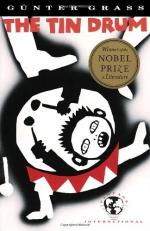|
|
The Tin Drum Chapter 33: Disinfectant
In the institution, Oskar says that he asks his keeper, Bruno, to measure his height each day after breakfast. Oskar, at present, measures four foot one, when for most of his life he was exactly three feet.
Oskar completes the story of Matzerath's funeral: after Oskar had thrown his drum into the grave, his son Kurt had heaved a stone and hit Oskar in the back of the head. Oskar leapt for his drum, but was pulled out by Old Man Heilandt without the drum. It was after this stone hit him that he began to grow, according to Maria and Fajngold, although he had been growing already.
When the group returned from Matzerath's funeral, they found new people living in the Truczinski flat, where they had been staying. Fajngold, Maria, Kurt, and Oskar moved downstairs to their original apartment. Maria and Fajngold thought Oskar was sick; finally they found an exhausted lady doctor from the army to examine Oskar; she smoked cigarettes and fell asleep. All she could say was that Oskar needed a hospital; the family should move away to the west. She gave Oskar pills for pain and left. Oskar's head swelled; he had a constant fever. He imagined in his fever that he was on a merry-go-round run by the Heavenly Father; God became Rasputin, the Goethe.
Fajngold took to spraying Oskar with Lysol to rid him of the infestation of lice that the Russian soldiers had delivered. Fajngold had been the disinfector at Treblinka Concentration Camp, and thus was an expert at removing lice. He had sprinkled disinfectant on so many dead bodies that he had lost count; the numbers did not matter. He had escaped the Concentration Camp during a revolt where the inmates had killed several guards.
Oskar's fever left him, then returned again, bringing Lysol baths with it. In the store, Fajngold phased out groceries in favor of black market goods that were always changing: sewing machines, furs, tools. Kurt became an expert in the black market trade. Anna Koljaiczek came by once, searching for kerosene and bringing stories of the destruction in the countryside; all of the towns had reverted to their prewar names. Both Vincent Bronski and Anna were recovering from wounds they incurred at the hands of the invading soldiers. She said:
"'Yes Oskar, that's how it is with the Kashubes. They always get hit in the head. You'll be going away to where things are better, only grandma will be left. The Kashubes are no good at moving. Their business is to stay where they are and hold their heads for everybody else to hit, because we're not real Poles and we're not real Germans, and if you're a Kashube, you're not good enough for the Germans or the Polacks. They want everything full measure.'" Chapter 33, pg. 416
When Fajngold wanted to introduce Anna to his family, she consoles him, saying that she, too, is always looking for her daughter Agnes, who never appears. Fajngold left her with kerosene, honey, and disinfectant; she put it under her skirt and left. Fajngold called to his family less and less; finally he proposed to Maria. But Maria declined, saying that Danzig was washed up; it was time to move to the west with her sister Guste. Three days later, she had travel papers for herself, Kurt, and Oskar. Fajngold took them to the station and the three boarded an overcrowded freight train headed west.




